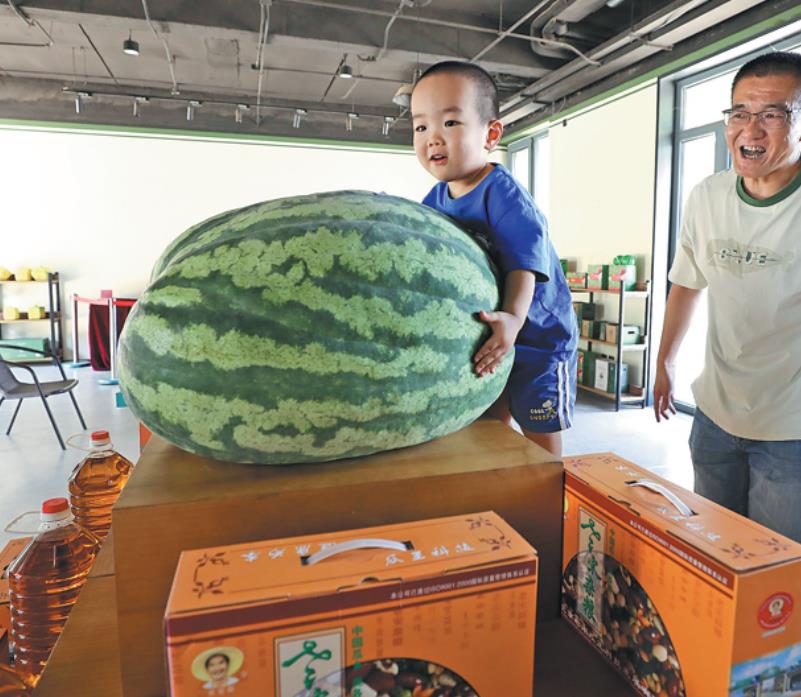Watermelon testers still in high demand
By Li Lei | China Daily | Updated: 2023-08-08 07:11
Traditional method of checking fruit quality thrives despite online sales

Once the fruit of choice in royal households, watermelons nowadays can be found in even the most humble homes in China.
The fruit's popularity has soared over the years, and online grocer Meituan reported that sales of watermelons on the platform had increased sixfold from 2020 to 2022, triggering increasingly high demand for watermelon quality testers like Malaysian expat Lee Jun Kang.
Lee, 32, is extremely busy in the summer months. Just by holding the fruit near his ear and knocking on the rind with his knuckles, Lee says he can tell by the sound if the fruit is ripe enough to be eaten or not.
Lee, who works for a rural cooperative set up by a group of watermelon farmers on the outskirts of Beijing, puts thousands of watermelons through the "knock test" daily, before the fruits are shipped to warehouses in downtown Beijing from where Meituan sources its supplies.
"August is a hot season for watermelon sales, and I check more than 10,000 fruits each day," he said. "When my knuckles grow numb, I just switch to the other hand."
Data from Meituan showed that watermelon sales peak in the hottest months of July and August, when more than 100,000 watermelons are delivered through the platform each day. The miniature varieties of the fruit accounted for 38.4 percent of total sales on Meituan last year, about 10 percent higher than in 2020.
Endearing habit
The practice of knocking on watermelons to determine their ripeness can be found across cultures. In China, it is considered an endearing national habit. Savvy buyers tap on the fruit before buying, to ensure their money is well-spent. The perfect fruit should neither be underripe nor overripe. Some buyers knock on the fruit despite not knowing what the hollow sound means just to negotiate a better deal from the seller.
As fruit sales have moved to online platforms in a big way, those who make a living by checking the quality of the fruits with their knuckles are much in demand.
Lee is one among a growing group of watermelon knockers who work with farmers in Panggezhuang, a sprawling production base in Beijing's southern Daxing district. Their task is to conduct knock tests on behalf of e-buyers and ensure that the fruits selected to be sold online are uniform in size and quality.
Lee, who was once an award-winning car racer, now describes himself as a "goalkeeper for watermelons".
He quit car racing about four years ago due to disruptions caused by the COVID-19 pandemic. He learned about melon-knocking as an emerging profession through a friend and decided to become an apprentice in Panggezhuang, where he was tutored by an experienced farmer.
After a year's trial and error, Lee worked independently as a quality checker. "It is a highly empirical task. During the apprenticeship, I often cracked open melons to confirm my judgment. There are just no shortcuts," he said.
'Fruit of the people'
Liu Wanlin, a retiree in Xining, Qinghai province, describes watermelon as the "fruit of the people".
"It is not like the tropical fruits such as mango and durian, which are expensive," she said.
Liu grew up in a rural part of the arid Qinghai-Tibet Plateau, which does not produce watermelons on a meaningful scale. She said "freedom of melons", a phrase meaning having as many watermelons as one wishes without worrying about the cost, is only a recent reality in her province, where the fruit is mostly shipped in from Gansu and Shaanxi provinces, as well as the Xinjiang Uygur autonomous region.
"I never tasted watermelons as a child. Now the fruit is the commonest treat in rural families in Qinghai," she said.
Song Shaozhe, who works with a hot pot chain in Wuhan, Hubei province, said iced watermelon is the top choice for many restaurants as the after-meal fruit, partly because of its relatively low cost.
"Melons are super sweet, and the dish is hot. They are a perfect match," he said.
Farming techniques such as greenhouses and cold-resistant new varieties have made it possible for the Chinese people to savor watermelons around the year.
Mass growth and consumption of watermelons in China date back to the Southern Song Dynasty (1127-1279). Before that, the fruit was consumed mainly by royal families as an exotic treat.
As the fruit made way into the diet of the ordinary people, watermelons became a constant theme in ancient Chinese poems, from those by Southern Song Dynasty poets Fan Chengda and Wen Tianxiang to Ji Xiaolan of the Qing Dynasty (1644-1911).
After the People's Republic of China was founded in 1949, generations have devoted themselves to watermelon breeding, churning out new varieties that have allowed the large-scale planting of the fruit, which slashed its price and improved its taste.
More than 50 new varieties popped up between 2016 and 2020.According to the United Nations Food and Agriculture Organization, China is the world's largest producer and consumer of watermelons. The per capita consumption of the fruit in the country is about 50 kilograms a year, said the FAO.
























